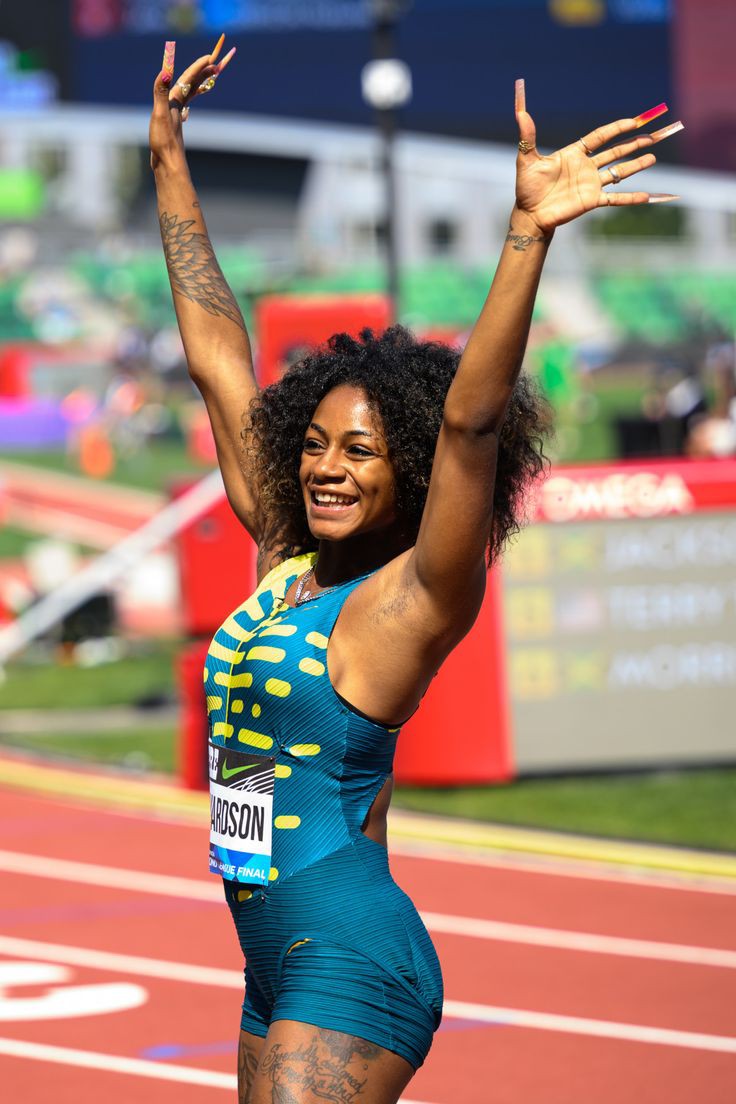In a historic and groundbreaking move for track and field, Sha’Carri Richardson has signed a massive $878.6 million contract extension, making her the highest-paid athlete in the sport’s history. This landmark deal signifies not only a remarkable financial achievement for the 24-year-old sprinter but also sets a new precedent for female athletes and those in track and field, a sport traditionally underpaid compared to others like basketball, football, or tennis.
Richardson’s rise to stardom has been marked by both her lightning-fast speed and her unapologetic personality. Since bursting onto the global stage with a 100-meter dash win at the 2019 NCAA Championships, she has quickly become one of the most recognizable faces in athletics. Now, with her unprecedented contract extension, she has cemented herself not only as an elite athlete but as a force for change in the sports world.
The Rise of Sha’Carri Richardson
Sha’Carri Richardson’s ascent in track and field began with a dazzling array of performances, culminating in her victory at the 2021 U.S. Olympic Trials. However, her Olympic journey was derailed when she tested positive for cannabis, which led to her disqualification from the Tokyo 2020 Games. Despite the setback, Richardson maintained a level of transparency and resilience that won her legions of supporters who admired her boldness and authenticity.
In the aftermath, she made a comeback by securing a series of high-profile victories, including a sensational 100-meter win at the 2021 Prefontaine Classic. Her blend of explosive speed and unapologetic personality caught the attention of sponsors, and she soon became a global ambassador for brands looking to capitalize on her marketability and unique persona.
Richardson’s ability to stand out both on and off the track has made her a magnetic figure in a sport that sometimes struggles to capture mainstream attention. Her striking appearance, distinctive hair colors, and bold fashion choices have contributed to her personal brand, making her a trailblazer for athletes who want to defy traditional stereotypes and celebrate individuality.
A Groundbreaking Contract Extension
The new $878.6 million contract extension signed by Richardson with a major multinational athletic company is a game-changer. The deal, which spans several years, includes not just salary and endorsement clauses but also performance-based bonuses and incentives. The massive sum dwarfs previous records in track and field, marking a shift toward increased financial recognition for athletes in the sport.
The contract extension comes on the heels of a series of lucrative endorsement deals Richardson has signed with high-profile brands, including Nike, Coca-Cola, and Beats by Dre. These partnerships, combined with her growing social media influence and commercial appeal, have allowed her to amass an impressive fortune in a short period.
Track and field athletes have historically struggled to achieve financial parity with athletes from sports like basketball and football. While stars like Usain Bolt and Allyson Felix have enjoyed lucrative sponsorships and contracts, the pay in the sport has often been considered far from what it should be given the level of athleticism required. Richardson’s contract extension changes the narrative and establishes her as not just a dominant sprinter but as a true sports mogul in the making.
The deal comes at a time when female athletes in various sports are pushing for better financial compensation and representation. As Richardson becomes the highest-paid track and field athlete in history, it underscores the growing importance of female athletes in the global sports marketplace. Brands and sponsors are beginning to understand that female athletes can bring in just as much, if not more, revenue than their male counterparts.
The Impact on Track and Field
Sha’Carri Richardson’s contract extension could have far-reaching effects on the future of track and field, especially regarding how athletes are compensated. With this new deal, there’s a potential for greater commercial investments in the sport. While traditional Olympic sports often struggle with consistent viewership and sponsorships compared to mainstream sports, Richardson’s success could pave the way for other athletes in track and field to demand better compensation and financial recognition.
The financial model for track and field athletes has long been fragmented, with many of the world’s best athletes only receiving payment through sponsorships and a few prestigious competitions. With Richardson’s contract extension, the sport’s governing bodies and brands may start to consider a new approach to rewarding athletes, offering better contracts, and fostering more commercial partnerships.

